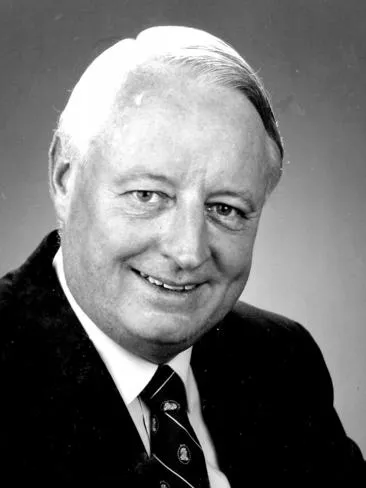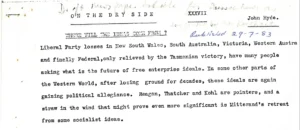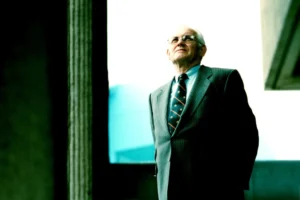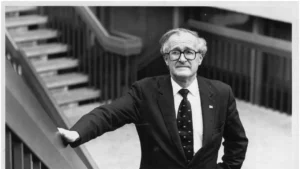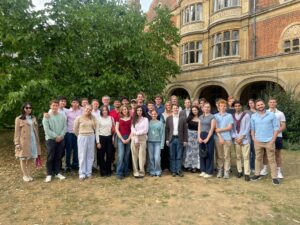‘What did you do for Australia this week?’
When Jim Carlton was a newly minted member of parliament, he used to chat to his colleague Kevin Cairns (the Liberal member for Lilley between 1963-1972 and again from 1974-1980) while they waited for cars to pick them up and take them to Canberra airport. “What did you do for Australia this week?”, Cairns would ask him. It was a question that stuck with Carlton throughout his parliamentary career, and no doubt kept him focused when the budding group of parliamentary dries was doing the hard work of advocating for economic reform from the opposition benches in the 1980s.
Jim Carlton was born in Sydney on 13 May 1935. Unlike his dry colleagues John Hyde and Peter Shack, Carlton entered parliament at the mature age of 36. He was more obviously a political animal, again unlike his dry colleagues being much more involved in university politics, becoming president of Sydney University’s Liberal Club and of the Students’ Representative Council while he was studying a science degree there in the 1950s.
After a career in the private sector – working first in the manufacturing industry in Britain and then for the American consulting firm McKinsey and Co – he worked in the organisational part of the Liberal Party, serving as the General Secretary of the New South Wales Division between 1971 and 1977. At the 1977 election, he was elected as the member for Mackeller (New South Wales), a seat that he held until his retirement in 1994. During this parliamentary career, Carlton was briefly Minister for Health in the Fraser government, and held the position of shadow treasurer between 1985 and 1987 (under John Howard’s leadership).
As outlined in a previous post in this series:
Hyde, Shack, and Carlton came together to form the ‘dries’, meeting in Carlton’s office each parliamentary sitting day. As Shack recalled, the three would meet “over Carlton-supplied Chinese green morning tea… [to] exhaustively discuss and plan how we could encourage and influence the conservative Fraser government to move to adopting more market-based and competitive policies.”
…
Hyde, Shack, and Carlton divided up the main issues they thought that the Fraser government should address and organised themselves tactically. Hyde would tackle the broad issues of budget reform, tariffs, and protectionism, honouring his mentor, Bert Kelly. Shack took on the Two Airlines Agreement, the policy of insulating Ansett Airlines and Trans Australia Airlines from any competitor companies which Fraser had renewed. Carlton argued against subsidies for domestic car manufacturers.
Peter Shack later recalled how he and Carlton were first “thrown together”:
Despite our significant age geographic and age differences we were immediately thrown together when the Prime Minister’s Office asked Jim to move the address-in-reply motion to the governor-general’s speech… and me to second. Thereafter, bound by our readily apparent and shared political philosophy and views and consequent policy prescriptions, Jim and I remained close parliament and personal friends until our retirements 16 years later.
Carlton’s maiden speech issued a call for a better interrogation of public policies. Without making the same philosophical references that Hyde and Shack had made in their maiden speeches, he argued that Australians had to get serious about weighing he costs and the benefits of public policy. “Overall, I believe it is necessary for us to have an absolutely creative approach to the new structure of our economy over the next 20 or 30 years and not to assume that we must necessarily be a totally tributary economy of overseas economies,” Carlton said. “It is necessary for us to look at our own skills. We have in Australia the necessary skills to look at the problem with creativity and imagination.”
Carlton was outspoken about social policy – placing himself on the left side of the Liberal Party socially – and this was on display from his first parliamentary contribution onward. In fact, this was on display much earlier. He later boasted that in 1956 he had “got the New South Wales State Council of the Liberal Party within about a dozen votes of overturning the White Australia Policy.” Although he is now better remembered for his contribution to economic policy, Carlton always saw this as a means to the end of improving social outcomes. George Brandis (Liberal Senator for Queensland, 2000-2018) later remarked that Carlton believed “that a good society depends upon a good economy, a compassionate society depends upon a prosperous economy, and a prosperous economy is underwritten by… economic reforms and liberalisation”.
Carlton’s private sector experience brought a slightly different perspective to the table when it came to assessing economic policy and government intervention. “I suppose I looked at it more from a micro-economic point of view, from a manager’s point of view,” he later recalled. His thinking about economic policy was informed by his experience of how government regulation and intervention impacts businesses at a very granular level. “As a former industrial manager, I know what it is like to manage on the shop floor at successive levels, with small numbers of people and large numbers of people,” he argued in parliament. “To do it with compulsory third parties present is very much more difficult… until [the government] gets down to genuine freedom of contract and eliminates that [union] monopoly power… it has not got to the heart of that matter.”
Shack credited Carlton with getting the original group of dries to be more organised. “We knew we collectively had inherited that baton of responsibility,” Shack later wrote, “but Jim correctly argued that we needed some tactical and strategic success. We could not effectively take on all big targets, all at the same time.”
In a 1982 speech to the Metal Trades Industries Association,1 Carlton argued that the term ‘assistance’ was a euphemism, used to describe “the Government’s conscription of one group in the community to pay for the supposed needs of another.” He argued that governments do not ‘assist’, but only redistribute. “Whenever I get the question: ‘What will we do if reductions in protection force us out of business?’, I am inclined to say: ‘If you can’t see the answer to that question then I fear for your shareholders, and also for the taxpayers and buyers of your products who will be forced to subsidise your failure to shift your investment into more productive areas.’” The message would have been undoubtably unpopular to a room full of beneficiaries of such subsidies and protection.
As has been noted previously, part of the important work the dries did was not only setting the stage for the Hawke and Keating Labor governments to engage in economic reform, but to encourage the Liberal-National coalition to support this reform. In this way, the dries contributed to the new political settlement that emerged after the 1983 election whereby both the right and the left sides of Australian politics supported economic liberalism. In addition to this, Carlton worked directly with the Hawke government to support their reform.
As recalled by the economist Ross Garnaut, who served as Bob Hawke’s senior economic advisor from 1983-1985, Carlton provided him with direct support after the Hawke government came to power. “Jim was one a small number of members of the Opposition parties during the high tide of reform who really did make change easier for Government. Important parts of the achievement of that remarkable period would not have been possible had not Jim Carlton thought long term Australian prosperity more important than short-term politics.”
In his valedictorian speech, delivered on 17 December 1993, Carlton remarked that:
When I first came into parliament both parties were essentially protectionist, both supporting the classic, original Deakin labour movement compact of the early 1900s – which was a great social compact but it had become outdated. To us it was a question of how soon that would be understood and how soon the parties would be shifted away from that. Both parties have now moved away from it – both major political groupings – in quite a dramatic way. This change has been tremendous.
Carlton said that throughout his parliamentary career he constantly asked himself that question Kevin Cairns used to ask him while they waited for a car to take them to Canberra airport: ‘What did you do for Australia this week?’ His role with the dries and with helping – organisationally and politically – to change Australia’s macroeconomic policy settings in the 1980s and 1990s provides a comprehensive answer to that question.
1 Which later amalgamated with the Australian Chamber of Manufactures to form the modern-day Australian Industry Group

